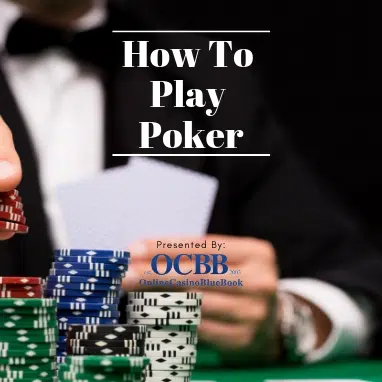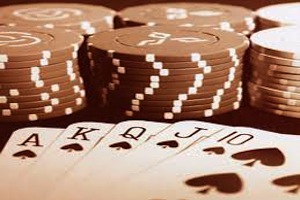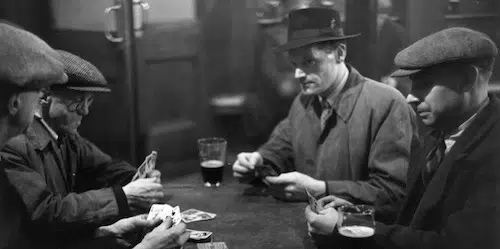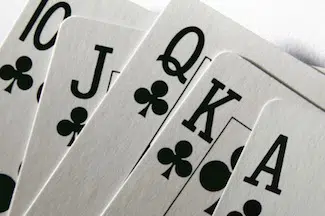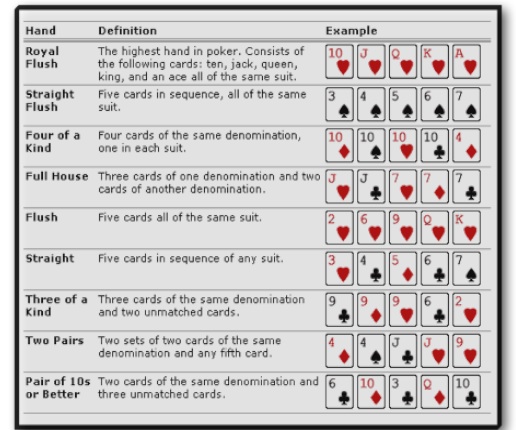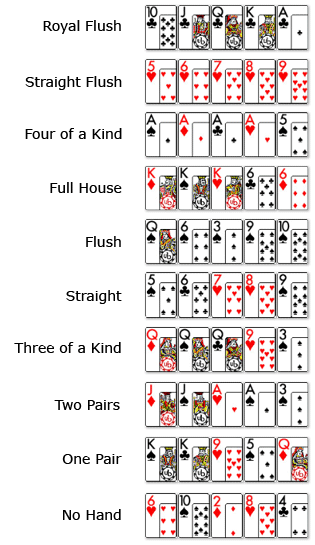How To Play Poker Tutorial
History – How To Play – Rules – Odds – Strategy – Pro Perspective
Poker is a competitive card game played among several players. In this game, the dealer does not interfere with the gameplay; he or she deals cards, monitors gameplay, and ensures the winner of each hand receives the pot. The casinos or poker venues make money by taking a percentage of the pot or charging players a fee; this is called the rake. Of course, some versions of poker have been adapted to become casino games where players play against the dealer representing the casino, also known as the “house,” but these are not the original poker games widely known and played by millions.
There are different versions of poker, but they all share the same primary concept, namely to beat your opponents via either having the best hand when it’s time for a showdown or to deceive them via a bluff – even with inferior holdings – and be the last person standing in hand. The showdown occurs at the end of a hand, where the remaining players will show their holdings; the highest poker hand will win the pot.
Poker can vary regarding the dealing order, the betting system, the stakes of play, whether you’re playing in a cash game or tournament format, and the wagering rounds between the dealing procedures. To master the game of poker and the poker rankings, follow the tutorial to help you understand the game and its rules. This tutorial includes the history of the game, the rules, the odds, and the strategy. It will help you obtain a better grasp of the game on a more professional level. Beginners could also benefit from our poker cheet sheet which includes a pros perspective from Poker author Amanda Botfeld.
Poker History
According to the British actor Joseph Crowell, the history of poker dates back to 1829 in Louisiana. The game was played between 4 players with 20 decks of cards. According to the book “An Exposure of the Arts and Miseries of Gambling” by Jonathan H. Green, the game started spreading from New Orleans to other areas of the United States. The game traveled with the boats of the Mississippi River. These boats had a reputation for having a lot of gambling activities onboard.
The game as we know it today was not the same as it was in those times. It evolved and went through several phases, specifically during the Civil War in the United States. These phases and circumstances resulted in multiple versions of the game, including Stud Poker and Straight Poker. Other versions came about with the introduction of new concepts like the wild card, community card, lowball, and split-pot poker.
The popularity of poker started to increase more rapidly in 1970. This is when the first-ever World Series of Poker (WSOP) took place. This was the first poker competition to be held on a broad scale, and it was staged annually at Binion’s Horseshoe Casino in Las Vegas. Those who won the WSOP’s Main Event in these early days included some of the biggest names in the poker world, like Bobby Baldwin, Puggy Pearson, Amarillo Slim Preston, and Doyle Brunson. Doyle Brunson went on to win 10 WSOP gold bracelets and is the author of the first book about poker strategy, called “Super / System.”
Poker Popularity Hits the Mainstream
By the 1980’s mainstream media capitalized on the popularity of poker. In the press, poker was portrayed and viewed as a recreational activity. It even appeared in over 10 episodes of the hit sci-fi TV show “Star Trek.” It was a weekly game the senior staff onboard the fictional spaceship enjoyed.
In the 1990s, poker rose to new heights when gambling spread in the United States. It was highly popular in Atlantic City, which at the time quickly became the nation’s second-biggest market, with Las Vegas being first.
The game truly boomed during the first years of the 21st century. A direct result of a perfect storm of three factors: hole-card cameras that allowed viewers to “play along from home” for the first time while watching televised poker, the advent of online poker, and the marquee victory of a Tennessee accountant named Chris Moneymaker in the 2003 WSOP Main Event. Online poker, in particular, helped the spread of the game to anyone who had a computer. Players were no longer obligated to leave their homes and find a brick-and-mortar poker room or home game to enjoy playing. As for the hole-card cameras, they single-handedly turned poker from a card game one could only play into a spectator sport that you could watch, enjoy, and be entertained by, all while rooting for and learning from the game’s best players.
Besides the WSOP, other poker tours started to capitalize on the game’s popularity. The World Poker Tour and the European Poker Tour are just two examples. On April 29, 2009, The International Federation of Match Poker (IFMP) was founded in Lausanne, Switzerland as the first poker governing body. They continue to work towards recognizing Poker as a Mind Sport, as well as securing the legislation that promotes the safety and legality of those playing poker both online and in bricks & mortar organizations.
How to Play Poker
How to play poker depends on the version itself. Different versions of poker have different gaming and dealing procedures and different wagering rounds. So to cater to the needs of all poker aficionados, we will discuss the gaming process of four of the most popular poker versions.
Straight Poker:
There is not much skill or decision-making needed in Straight Poker. In this game, each player will place an Ante bet and is dealt 5 cards. A wagering round will then begin, and players will raise and re-raise or fold. When the wagering round is over, each player will show his/her 5 cards. At the showdown, the highest poker hand will win and scoop the pot.
Texas Hold’em Poker:
Texas Hold’em Poker is one of the most popular poker games in the world, both online and in brick and mortar poker rooms around the globe. It’s also the type of poker that dominates television coverage.
The game starts with the two players seated to the left of the button (dealer position) each placing a blind (bet). They will then be dealt two cards each, which will only be seen by themselves. A wagering round will then be held in which players to the left of the blinds consecutively decide whether to call, raise, or fold their holdings. After that, the dealer will deal the flop, which consists of three community cards dealt on the poker table.
Another betting round will commence among the remaining participants in the hand. Starting with the first player still active left of the button. A fourth card (the turn) is then dealt, then another wagering round occurs, and then the last card (the river) is dealt. Finally, the last (and usually the most aggressive) betting round will take place. The remaining players will then reveal their two cards. Then the player with the best 5-card hand combined from their holdings and the board of community cards will win the pot.
7-Card Stud Poker:
This game was the most widely played poker game in the world before it was overtaken by Texas Hold’em Poker. In 7-card stud poker, players will start the game by placing an ante, and they will also get 2 down-facing hole cards like in Texas Hold’em as well as one face-up card. The player with the lowest face-up card must make a forced “bring-in” bet. In consecutive fashion, players can then choose to call, raise, or fold. Another face-up card is then dealt. The player with the highest-ranking face-up cards starts the wagering moving forward. A third and then a four face-up card is dealt, with wagering rounds in between.
Finally, a third face-down card is dealt to all remaining participants, followed by one final betting round.
It’s worth noting that all betting in 7-Card Stud Poker is made according to fixed limits (rather than “No-limit” or “Pot-limit” play. After the final wagering round, players will reveal their hole cards, and the best five-card hand-formed will win. This game can also be played “hi/low” with half the pot being awarded to the player with the highest hand and the other half of the pot being awarded to the player with the lowest qualifying hand (having five unpaired cards each of which have a value of 8 or lower).
5-Card Draw Poker:
5-Card draw poker is the version of the game that was adapted to video poker. In this game, players will be dealt 5 cards at once, face-down. A wagering round will take place, then players will select the cards they want to discard and replace. They toss them back to the dealer and get replacement cards to form their final 5-card poker hand. A final wagering round will take place before the showdown.
Top 3 poker Casinos
-
#1 poker Casinogold
★ 8.8 Rating
$3,750 Bonus
-
#2 poker Casinosilver
★ 8.7 Rating
$10,000 Bonus
-
#3 poker Casinobronze
★ 8.7 Rating
$3,500 Bonus
Poker Rules
The rules of poker are pretty straightforward, but they do differ from one version of the game to another. The basic rules remain the same across games, like the ranking of the poker hands. Not knowing which hand is stronger can result in a disaster at the poker table. You could be prone to losing your entire stack of chips…by accident!. Please find below the order of the different poker hands from the lowest to highest:
High Card:
A High Card hand will win a pot if no players have any poker hand with a ranking of one pair or higher. The strength of the high card against the same high card depends on the kicker, which is the second card in value. For example, a hand that has an Ace and a Jack will beat a hand that has an Ace and a 9 because it has an Ace High Card and a Jack kicker.
A Pair:
If a poker hand has two cards of the same denomination, it is a pair. The kicker also determines the strength of the pair against the same pair in the same way as the High Card.
Two Pairs:
When a player has two pairs in his/her hand, the fifth card is the kicker which would indicate the winner between two identical two-pair hands.
Three of a Kind:
A Three of a Kind is when a poker hand has three identical cards. For example, a hand that consists of J, J, K, J, and Q is a Three of a Kind hand.
A Straight:
A Straight is when a player gets 5 consecutive cards in his/her poker hand, regardless of their suit. An example is a hand with 4, 5, 6, 7, and 8.
A Flush:
Players have a flush when they get 5 cards of the same suit, regardless of their value. In other words, a hand that consists of (for example) J, K, 6, 5, and 4 of spades makes a flush. The strength of the flush against other flushes depends on the highest card in hand.
Full House:
This indicates a mixed hand with both a pair and a three-of-a-kind. Players must get 2 and 3 identical cards to qualify as a full house, such as a hand of J, J, K, K, and K.
Four of a Kind:
This is achieved when players get four identical cards. There is another similar hand that is called Five of a Kind, which can only be possible if there is a joker or wild card in the deck of cards. Four identical cards + a joker/wildcard will form Five of a Kind.
A Straight Flush:
A mix between Flush and Straight. It occurs when players get 5 cards that are consecutive in value. As well as of the same suit, for example, 7, 8, 9, 10, and J of diamonds.
Royal Flush:
This hand is achieved when players get a straight flush that starts with a Ten and goes up to an Ace. For example, a poker hand of 10, J, Q, K, and A of Spades would be a Royal Flush. This is the strongest poker hand possible (again, unless there are jokers/wild cards in play that would allow for a Five of a Kind hand).
Top 3 poker Casinos
-
#1 poker Casinogold
★ 8.8 Rating
$3,750 Bonus
-
#2 poker Casinosilver
★ 8.7 Rating
$10,000 Bonus
-
#3 poker Casinobronze
★ 8.7 Rating
$3,500 Bonus
Poker Odds
The concept of poker odds comes into play when trying to calculate your chances of winning the hand versus those of your opponents. To understand and know your poker odds, you must calculate the “outs”. The “outs” are the cards that will improve your hand and make it a winning one. If you have a hand of 3, 4, 5, 6 and you think the other player has two Aces; you need a 2 or a 7 so you can achieve a straight and thus win. So 2s and 7s are your “outs.”
For Example:
You have two cards in your hand that are Qh9h, and the board on fourth street reads AhKhXX (X means any random card). Your opponent at this stage of the hand will likely have you beat. If you catch one of your “outs” (a heart), you will have the nuts; i.e., the best possible hand in this situation, a flush.
Every card deck contains 13 cards of the same suit: you have two of them in your hand, and the board has another two, which means there are 9 hearts left in the deck. Thus, you have 9 “outs.”
Now it is time to turn these “outs” into numerical odds so you can make a decision. Since there are 52 cards in the deck and you have 2 cards in your hand, and there are four on the table, that leaves 46 cards (we ignore what the other players are holding).
That means that you have 9 cards out of 46 possible cards that could complete your flush for the win while there are 37 cards that would not complete your flush. The odds of you getting a winning card on the river are 37:9. This can be simplified to approximately 4 to 1. Therefore, you are 4 times more likely to lose the hand than win it.
To Call the Bet or Not?
Now that we know your odds of winning are 4:1, the next decision is whether to call the bet or not. Making the correct decision depends on the amount of money in the pot. This does not mean you should automatically go for it if the pot is big. But rather that you should look at the ratio of the money you would win compared to the size of the bet you are thinking of calling. So if your opponent bets $10, making the pot $100, you have the chance to call $10 on 4:1 odds to win $100. You should always call in such a situation simply because, 4:1 odds means you will win $40 for $10, while you are getting odds to win at 10:1. This type of calculation is referred to as knowing your “pot odds.”
Poker Strategy
Poker is a game of decisions, and you will have to make the correct decisions to win consistently. Even the best poker players lose quite often, so do not give up when you lose a few hands. You will win more often than you lose if you make good choices. Even players who have made it to “The Hall of Fame” are still constantly working on improving their poker game.
Poker is a mathematical game that offers players incomplete information. Although that might sound a little complicated, it is not. On a basic level, winning a poker hand starts with selecting which starting hands to continue playing. If you hand-select properly and enter the fray with a good hand more often than the other players do it would mean that you would essentially, win more often than they do.
The starting hands are very important. However, it is only one piece of the poker strategy puzzle. After deciding which hands to play, you will also have to know how to play that good hand, when to raise, when to call, and even when to fold — even if you have a good hand. You will have to calculate the odds, recognize the betting patterns of other players, use your position, and bluff. All of these need years of practice to perfect.
Don’t Become Emotional
Emotions can ruin your poker game. Some players might try to get on your nerves or use your emotions against you; to put you on tilt. You should always keep calm and avoid any emotional play. Being emotional will cause you to make bad decisions that are based on emotions rather than numbers. For example, if you are on a losing streak, other players might start to needle you knowing you are already on edge because of the losing streak. This could cause you to make poor plays and bad decisions because you are frustrated at losing and trying to recoup your losses. If that happens, leave the game to cool off for a bit. The game will still be there in a couple of hours. It is going to be there tomorrow as well. Clear your mind before you start playing again.
Bluffing
It takes tons of practice to know how to integrate proper bluffing strategies into your poker game. You need more than just the ability to maintain a good poker face. Having a good poker face means keeping the same facial expressions regardless of whether you have a good or bad hand, so players will not know when you are bluffing. Bluffing means you will bet, raise, or even go “all-in” despite not having the best hand.
Basically, the aim of a bluff is to get players with superior holdings to fold out of fear that your holdings are actually more superior to theirs. You should never bluff with reckless abandon. Choose your bluffing spots wisely, as your opponents are continually learning and improving their reads on you. The most effective bluffs are those made when the conditions correctly warrant them. Pay attention to everything going on at the table, the board textures, and how emotional your opponents are getting, and bluff (or choose not to bluff) wisely.
What’s Next?
Now that you understand the rules, odds, types, and overall poker strategy, it’s time to find a room that offers paid or free poker online! Head on over to our poker rooms page to find the best online poker games. Good Luck!
Pro’s Perspective: Poker Strategies and Tips with Robbie Strazynski
The game of poker famously “takes a few minutes to learn but a lifetime to master”. The above sections give you an overall appreciation for the game and its history. As well as a brief overview of the rules and basic strategies. Don’t think that you’re primed to become an instant poker legend just because you’ve read this one comprehensive article. All of the game’s greatest players agree that only with continued study can you stay on top of the mountain and rule the game.
Even the game’s Hall of Famers are still working on improving their games. A beginning to intermediate player (presumably like you, dear reader) could also stand to learn a thing or two. While I’ve never played the game professionally I’ve got enough years of experience playing the game recreationally and covering the pros to offer you a few solid tips that will undoubtedly help boost your bankroll. Here are three tips that will certainly help you start off on the right path in poker, even if you don’t intend to become a professional:
Game Select with Care
When you walk into a brick-and-mortar casino poker room or enter an online poker lobby, you’ll notice that there are many games running simultaneously. At some tables, they’ll be playing for high stakes. While at other tables, you’ll notice significantly smaller stack sizes and average pot amounts. What’s common among both professional and recreational poker players is that no matter what, everyone plays to win.
By selecting a table you feel comfortable at; i.e., you’re playing a game where the opponents aren’t too intimidating, and it’s for stakes that won’t break you financially, you’re giving yourself the best shot not only at preserving the chips you buy in for, but also stacking up on as many of your opponents’ chips as possible.
Pick Up a Strategy Book…or Two…or More
As mentioned, even the game’s greats are still learning and improving. Of course, the more playing experience you have, the better your poker game will become. But, there are also plenty of other ways to improve.
One of the most tried and tested ways to get better at poker is to read up on poker theory. The aforementioned “Super / System” by Doyle Brunson is thought to be the game’s “bible,” and it’s a must-read. Dozens upon dozens of other poker books have been penned by some true talents of the game over the years examining everything from behavioral tells to advanced mathematics, from cash game play to tournament strategy, and much more.
Free online study resources can only take you so far. If you’re looking to improve your poker game, it’s worth spending some money and investing in poker books. In all likelihood, you’ll recoup your investment many times over if you put in the hours to study them well.
Take Notes
Poker is a game, of course, and as such it’s something you can always get better at. Much like a subject you study at school, it pays to take notes. Even more, it’s difficult to process, internalize, and remember all of the information coming at you while you’re seated at the online or virtual tables. You’d be doing yourself a great disservice if you weren’t recording things for later study.
At land-based casinos, you can take notes the old-fashioned way, with a pen and paper/notebook or via a mobile app like Poker Notes Live. Also, online poker rooms almost universally come with built-in note-taking capabilities.
At the very least I’d recommend recording your buy-ins, the stakes you’ve played for, the length of your sessions, and how much you’ve won/lost. This way you can then expand your note-taking to include notes on tells you’ve noticed in your opponents. For instance – whether physical or in their bet sizing.
Studying your notes after and in between your poker sessions is usually quite an enlightening exercise. Developing the habit of effective note-taking in poker means that you’ll often notice quite a few things about your play. As a result, you will be able to correct mistakes, optimize the moves you make, and further maximize your potential win rate.
Playing Poker Online
If you’re interested in playing poker online, be advised that for all the similarities it has to live poker, there are differences. It plays far more like a video game, for lack of a better description, in that many players are quite simply “clicking buttons” and making “pre-programmed” decisions based on statistics they’re able to view via a HUD (heads-up display), which provides them with lots of additional information. Playing online allows you to multi-table, whereas in live poker you’ll only be playing at one table at a time. Also, with live poker the lowest stakes you’ll be playing for will be $1/2 unless it’s a home game, whereas online you can play for $0.1/0.2 stakes. Above all, just be sure that the online poker site you choose to play on is licensed and regulated in your jurisdiction.

